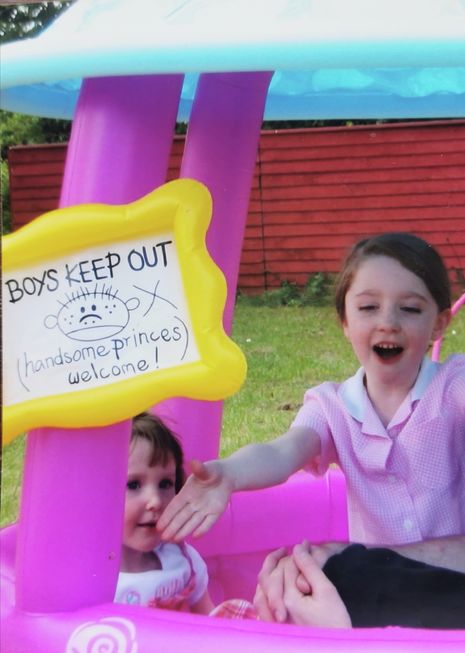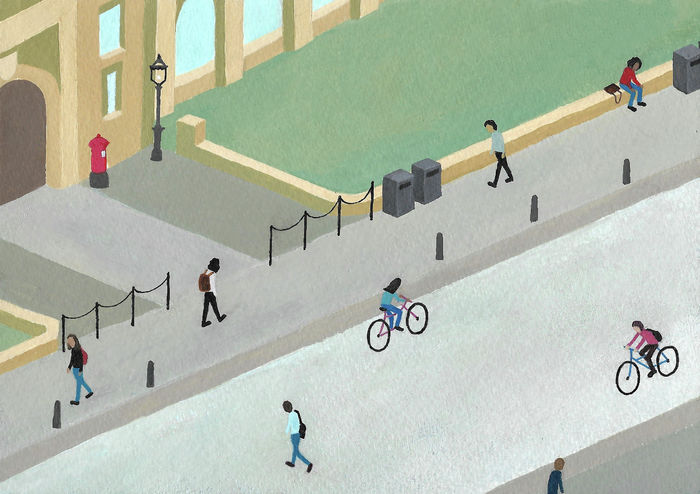Is choosing uncertainty a privilege?
“My mum’s defence of being ‘settled’ disrupted my moralistic ideals”: Deborah Cartmill explores the cultural and economic side to aspirations for career and relationship stability

With the hazy evening sun on my skin and the golden gorse bushes in full bloom, my daily walk was set to be a joy. Having a garden, isolated walks and a view of the Ring of Gullion from my window, I know how lucky I am to be isolating at my parents’ home in rural South Armagh. Homelife, however, is a transition for all of us; the culture and identities we embrace at university can be harshly brought into question under the austere light of our upbringings – a disjunct I experienced when we met a neighbour on our daily walk.
“At eighteen years old why are people so keen to map out someone’s career and marriage?”
She had just been accepted to study accountancy in Belfast, a wonderful achievement we all congratulated her on. After we parted ways my mum commented appraisingly on her hard work, and then on her steady boyfriend (as though she had also earned him through diligence and application). I couldn’t help but detect a hint of jealousy in her tone, a resentment which, whilst subtle, screamed to me: ‘Why does my daughter have no clue what career she wants? And why does it seem that she couldn’t get a steady boyfriend if we stuck a magnet down her bra and set her beside a man made of iron filings?’ (to steal a phrase from Penny - the archetypal pushy mother from the BBC comedy ‘Miranda.’) I have to admit a feeling of odd discomfort in my congratulations too, born out of frustration that she had her whole life to figure out what she wanted to do with her talent and education, yet knowing people would count her as ‘sorted’. At eighteen years old why are people so keen to map out someone’s career and marriage, to put a tick beside the only two boxes that seem to matter: ‘career’ and ‘relationship’?
The walk having been notably injected with an air of unease, I commented; ’The biggest difference I have noticed between here and university is that people are much less concerned about ‘getting settled and sorted.’’ I blame lockdown boredom for my knowingly pointed comment, bringing to the fore a tension that had been going unspoken. A tone of defensiveness immediately arose. ‘What’s wrong with having your life sorted? Is a good career, marriage and kids so bad?’ I’d like to clarify that these things, in and of themselves, are entirely admirable - I rather condemned the pressure surrounding them.
“As a Christian I believe our value is intrinsic, not defined by social markers of success, money or relationships”
I had almost automatically (and a bit self-righteously) written off the desire to have these things as part of a ‘middle class’ desire to conform, to be socially acceptable and keep up with the neighbours. Inflected with a rural Irish, traditional ‘Christian’ morality, the pressure seemed to me hypocritical and a form of idolatry where the god was social ease. A life dictated by suffocating insularity and concern with what the people in the pew behind in church would think, does not seem like a life at all. Gossip around the kitchen table often centres around relationships, or why an individual lacks one (translation: ‘What’s wrong with them?’). Casually equating someone’s worth and value on their relationship and career status distorts their self-esteem into a balloon, swelling up when relationships and interviews are going ‘well’ and succinctly deflating with every rejection letter or embarrassingly bad date.
As a Christian I believe our value is intrinsic, not defined by social markers of success, money or relationships. Jesus was single, Paul was single and many Biblical passages make clear that singleness can be a ‘gift’. It has always immensely confused and frustrated me that the Christian culture seems to idealise young marriages and social convention. The early Christian church resembled more of a radical, socialist community, for example ‘tithing’ was essentially a form of voluntary tax to support neglected members of society. The Bible’s encouragement to ‘deny’ yourself for the glory of God and betterment of others seems to stand at great odds with Western individualism.
“Having the freedom to shun socially prescribed goals is uncomfortably wound up with economic privilege...”
However, my mum’s defence of being ‘settled’ disrupted my moralistic ideals. The bubble of financial and social security I have enjoyed at university - based on bursaries, grants and living in the same staircase as my friends - is not a reflection of real life. My mum was genuinely scared that I might decide to travel or do an unpaid internship, not exactly sure where my pay cheques for the next year would come from. Explaining ‘alternative’ life plans my mum asserted; ‘Well those people must have parental money to fall back on. They know that ultimately they will never struggle to pay the bills.’ Reminding me that I couldn’t rely on ‘The Bank of Mum and Dad’ to bail me out if I chose a non-traditional career path, I realised that the idea of being ‘settled’ was more nuanced than I had given credit. Having the freedom to shun socially prescribed goals is uncomfortably wound up with economic privilege, based on an assumption that things will always be alright, that there’ll always be a place to sleep and money in the bank account. She questioned why I would squander my security by choosing an insecure path after the sacrifices she had made and the privilege I have had to receive a good education? The entrenched nature of the capitalist system means that if you want to step outside of its dictates, you must have benefitted enough from it to have security.
A hardened realist, and occasional cynic, my mum reminded me of the truth that life is hard. Having a stable career and a ‘steady’ companion with which to unconditionally share burdens, financial and emotional, is not insignificant. Mulling on the thorny economic, social and emotional terrain of ‘being settled’, I have no definitive conclusions and I’m not sure that such a personal issue gives rise to definitive conclusions. It is clear, however, that no moral or social judgements should be attached to someone’s choices, whether we are speculating on their ‘failure’ to have the 2.5 kids lifestyle or all too quickly accusing someone of being old fashioned for rushing to ‘settle down.’
 News / Clare Hall spent over £500k opposing busway 24 December 2025
News / Clare Hall spent over £500k opposing busway 24 December 2025 Comment / The ‘class’ of Cambridge24 December 2025
Comment / The ‘class’ of Cambridge24 December 2025 News / Caius mourns its tree-mendous loss23 December 2025
News / Caius mourns its tree-mendous loss23 December 2025 Comment / Yes, I’m brown – but I have more important things to say22 December 2025
Comment / Yes, I’m brown – but I have more important things to say22 December 2025 News / Girton JCR publishes open letter expressing solidarity with Palestine25 December 2025
News / Girton JCR publishes open letter expressing solidarity with Palestine25 December 2025










